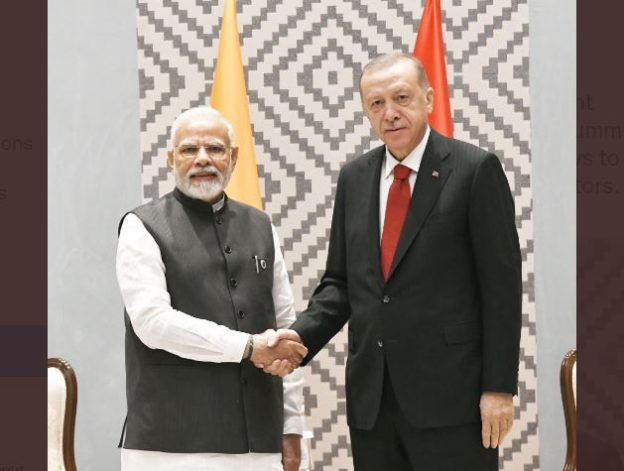The India-Turkiey relations had been overshadowed by their Cold War perspectives and biases mostly fed by the lack of communication and exchanges.
The reconfiguration of post-Cold War India-Turkiye relations continues to remain an unfinished task that no side had the opportunity to bring to its logical conclusion. It is a difficult and complex yet possible task to revise and strategize this important and irreplaceable relation. There is no country like Turkiye for India in this important geography and there is no country as promising as India for Turkiye. It is important to note that both President Erdogan and Prime Minister Modi have never left hope and never stopped trying again and again. Modi and Erdogan are going to be the two leaders in their bilateral history, who had been meeting and talking to each other more than their predecessors had spoken in the past. Both leaders have met three times on the sidelines of G20 Summits in Antalya (Turkiye) 2015, Hangzhou 2016, Osaka 2019, once on the sidelines of the BRICS Plus Summit in Johannesberg in 2018, and once on the sidelines of the recently held SCO Summit in Samarkand, Uzbekistan on 16 September 2022. President Erdogan visited India in May 2017. No Indian Prime Minister has visited Ankara after Prime Minister Atal Bihari Vajpayee’s hugely successful visit in 2003.
The India-Turkiey relations had been overshadowed by their Cold War perspectives and biases mostly fed by the lack of communication and exchanges. Interestingly, their bilateral agenda does not include any subject that may be considered problematic or unresolvable. At least, the issue of Jammu and Kashmir, on which the Turkish side has previously made statements at international forums, has rarely figured in their bilateral exchanges. The issue of Jammu and Kashmir, the main contention and source of mistrust between the two sides, is rarely a subject of Turkish concern. When Turkish Prime Minister Turgut Ozal returned from his famous India visit in 1986, the annual diary of the Turkish foreign ministry documented what had transpired between him and his Indian counterpart Rajiv Gandhi. In his post-visit remarks, he explained how important it was to improve India-Turkiye relations beyond the issues of Cyprus and Jammu, and Kashmir. It was not the first time when the two sides had tried to improve their understanding of issues that assumed great importance to them, Kashmir and Cyprus. Both issues have merit in their specific contexts and can be addressed only within their specific frameworks. In his last two statements on Kashmir at the United Nations General Assembly, in 2021 and 2022, Turkish President Recep Tayyip Erdogan has acknowledged the importance of these frameworks.
In the past few months, Indian and Turkish sides have been actively exchanging their views and perspectives on all issues of bilateral and regional importance including Jammu and Kashmir and Cyprus as Indian External Minister Dr. Jai Shankar has done during his meeting with his Turkish counterpart Mevlut Cavusoglu in New York on 21 September.
The two breakthrough meetings, the Erdogan-Modi meeting in Samarkand and the Cavusoglu-Jaishankar meeting in New York have signaled a new shift in India-Turkiye relations towards confidence building and improving their bilateral relations in the background of rapidly changing regional and global context. In the ongoing regional and global changes, specifically after the Ukraine war, Azerbaijan-Turkiye-Armenia normalisation process, and Turkiye’s normalisation offensive with its Middle Eastern neighbours, India and Turkiye have new opportunities not to be missed. The recently held meetings indicate that both sides are indeed exchanging their thoughts and weighing ways of cooperation beyond bilateral transactions.
The Turkish side has acknowledged that India’s growing relations with Persian Gulf states are an important factor to bring peace, stability, and security to the region. Turkiye played an important role in minimizing the impact of the Qatar-Gulf dispute. Even though Turkiye was then accused of siding with Qatar, the Turkish side insisted that she gave importance to unity and solidarity among the Gulf nations. Turkiye had previously offered close cooperation with Saudi Arabia and the UAE. After many years, the Turkish side has successfully repaired the relations with both relations towards evolving a regional approach. It took a long time and effort for the Turks to convince Egypt and Israel as well about her intentions in the Mediterranean Sea where they have common interests that can be achieved through close cooperation, not confrontation. In Eurasia, Turkey has made important gains by helping the resolution of the long pending Azerbaijan-Armenia dispute over Nagorno-Karabakh and seeking reconciliation and mutually useful relations after the 2020 war. In Central Asia too, Turkiye has improved trade relations with all Central Asian countries, and the establishment of the Turkic State Council is considered a new framework of close cooperation among the Turkic-speaking states. In all three regions, India has huge stakes and has succeeded to deepen historical and civilizational relations. India fully understands that the Central Asian countries need reliable trade and security partners beyond Russia and China. The American influence in the region has already declined due to its disruptive departure from Afghanistan in 2021. Indian trade relations can neither be a replacement for, nor competitive enough to China’s huge trade and infrastructure investments in Central Asia, Africa, or other regions where Indian interests are of high stake. Indian and Turkish companies have the opportunity to collaborate globally and partner in more transparent and locally-engaged ventures. Turkiye and India may disagree on many issues but they share democratic politics, a transparent market economy, and centuries-old civilizational confidence and trust, enough to talk more, resolve their differences, and partner in their shared journey for a win-win bilateral, regional, and global cooperation.
https://www.financialexpress.com/defence/time-for-turkiye-indias-regional-and-global-cooperation/2689876/





